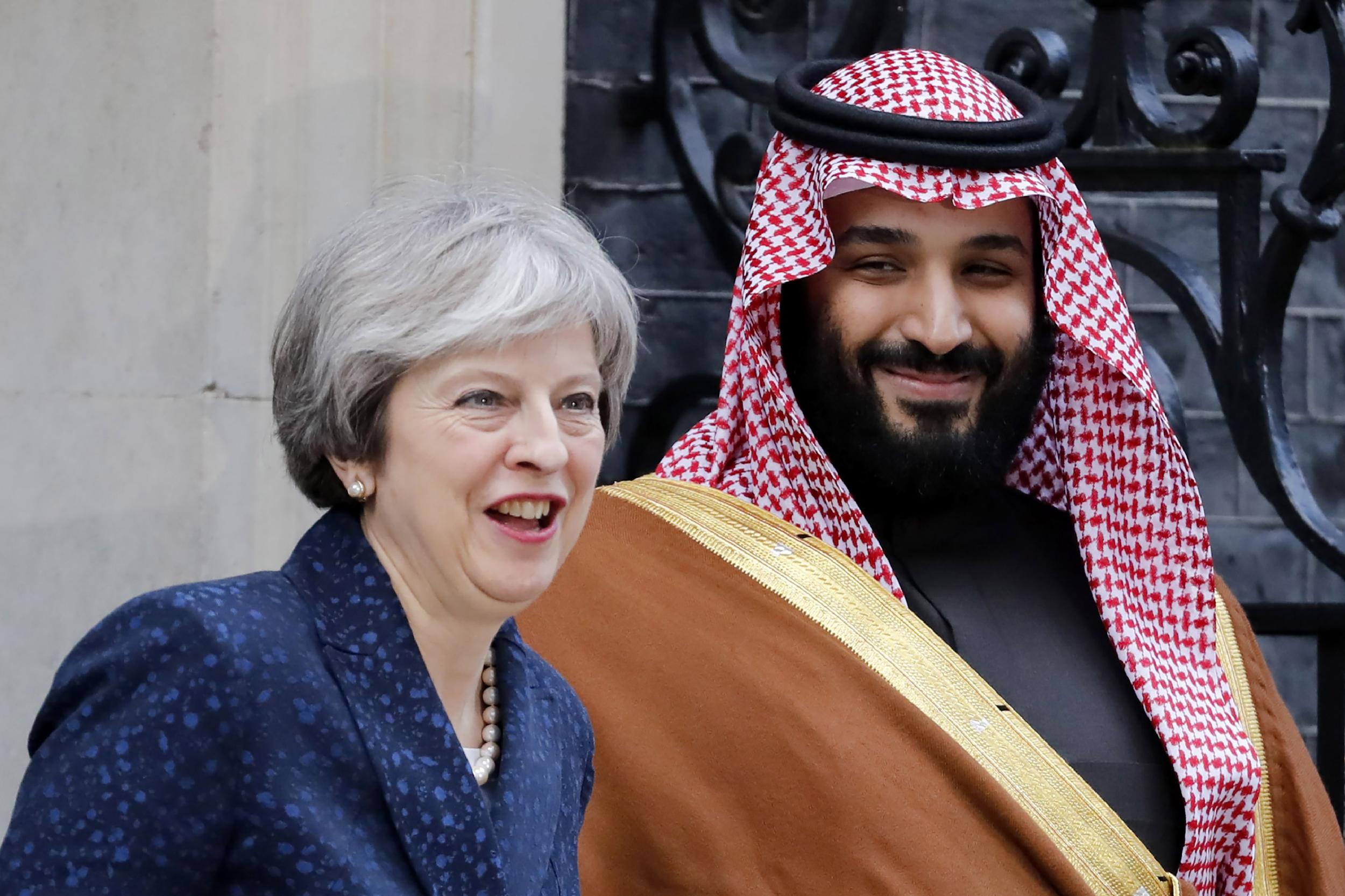Mohammad bin Salman UK visit: Oil company flotation not human rights will be the focus while the Saudi Crown Prince is in London
What better way can there be to cement the new ‘special relationship’ between his country and Britain than place the Aramco flotation in London?

There will be no shortage of red carpets for Mohammad Bin Salman’s visit to Britain with three generations of the royals lined up to meet the Saudi Crown Prince. Lunch with the Queen will be followed by dinner with Prince Charles and the Duke of Cambridge. But it is the tea with Theresa May in between where the real business of the trip is due to take place.
And that real business is business, or trade deals. There is little ambiguity about this. The 32-year-old Prince, now effectively the ruler of the kingdom, is carrying out economic as well as social reforms and the UK stands to get a slice of this commercial action – a very welcome boost at a time of deep uncertainties over Brexit and the spectre of an international trade war starting with Donald Trump’s imposition of tariffs on steel and aluminium imports.
The Saudi delegation will meet Ms May and her Cabinet in Downing Street to launch a “Strategic Partnership Council” between the UK and the kingdom to “encourage Saudi Arabia’s economic reforms and foster cooperation on issues such as education and culture and security”. The talks will “usher in a new era of bilateral relations, focused on a partnership that delivers wide-ranging benefits for both of us”, according to a No 10 spokesman.
Ministers and officials in London point to this country being chosen as the first destination in the West by Prince Mohammad as an illustration of how highly he values British friendship. And Britain should reciprocate, goes the argument, by supporting his drive for reform and to modernise and help achieve his Vision 2030, which would supposedly empower a younger generation, promote moderate Islam and change the landscape with new cities.
But the visit was always going to be controversial with the crowds turning up there to jeer rather than cheer. The protests are about the continuous bombing of Yemen, with great loss of lives, by a Saudi-led coalition and the kingdom’s record on human rights.
“The Crown Prince should never have been invited to Downing Street; he leads a regime with an appalling human rights record and has overseen the destruction of Yemen,” said Andrew Smith of the Campaign Against Arms Trade. Ms May, he charged, was “putting the interests of arms dealers above the rights of Yemeni people”.
Recently released figures show that beheadings in Saudi Arabia have doubled since the Prince came to power. The following eight months saw the execution of 133 prisoners, compared with 67 in the eight months before that.
Maya Foa, the director of Reprieve, an organisation that campaigns against capital punishment, stated that “the doubling of executions under the new Crown Prince reveals that, beneath his glossy public image, Mohammad bin Salman is one of the most brutal leaders in the kingdom’s recent history. When she meets the Crown Prince, Theresa May should urge him to commute the sentences of all child protestors facing execution.”
Ms May, said Downing Street, will raise humanitarian concerns, especially over Yemen, with Prince Mohammad and ask for an easing of the Yemen blockade by the Saudi coalition, which is causing severe difficulties for international aid getting through.
In reality, however, Ms May’s options are limited. Britain does not have much power of persuasion and lecturing the Saudis, ministers hold, will be counterproductive. The simple fact remains that the Prime Minister’s calls on aid will need to be tempered by the need for Saudi trade.
The great prize in this is the fabled flotation of Aramco, the Saudi national oil corporation, which is set to be the biggest ever in the world at $2 trillion (£1.44 trillion).
There were reports that the Saudis may have to shelve it, offering instead a private stake sale to foreign governments, including China. But Prince Mohammad has denied this, saying the public offering, crucial to his economic plans, is on track. The stock exchanges of London, New York and Hong Kong are in the running for this hugely lucrative listing. Some senior Saudi officials are said to be pushing for New York but the company itself is said to favour London.
The British Government has campaigned hard for London, including arranging a $2bn loan for the company with the help of UKEF, the UK credit export agency. The City regulator has proposed rule changes for the flotation to take place and Downing Street has stressed the “strong case” London has for the flotation.
But the shadow of Donald Trump now looms over this. He is said to have raised the Aramco flotation on his first international visit as President to Riyadh, during which he announced $110bn in arms sales to the kingdom. Mr Trump has since publicly appealed to the Saudis to list Aramco in New York. One tweet stated: “Would very much appreciate Saudi Arabia doing their IPO of Aramco with New York Stock Exchange. IMPORTANT to the United States!”
The claim of Brexiteers that Mr Trump would be the saviour on trade after departure from the European Union is dissipating. Ms May’s appeal to the President not to impose the steel tariffs, which would be deeply damaging for Britain, was brushed off by the US administration.
Prince Mohammad goes to New York after London. What better way can there be for the Saudi Crown Prince to cement the new “special relationship” between his country and Britain than place the Aramco flotation in London?
Join our commenting forum
Join thought-provoking conversations, follow other Independent readers and see their replies
Comments